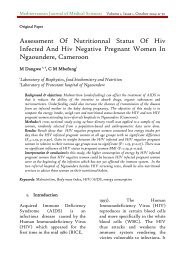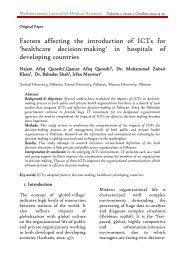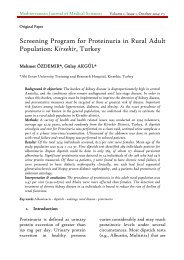Mediterranean Journal of Medical Sciences MJMS
Mediterranean Journal of Medical Sciences,aims to provide a platform for knowledge sharing among academicians, students, researchers, physicians, government entities and other non government entities. Issues : 3 per year ISSN 2385-2712 EISSN 2385-2453 http://mcmscience.org/
Mediterranean Journal of Medical Sciences,aims to provide a platform for knowledge sharing among academicians, students, researchers, physicians, government entities and other non government entities.
Issues : 3 per year
ISSN 2385-2712 EISSN 2385-2453
http://mcmscience.org/
You also want an ePaper? Increase the reach of your titles
YUMPU automatically turns print PDFs into web optimized ePapers that Google loves.
<strong>Mediterranean</strong> <strong>Journal</strong> <strong>of</strong> <strong>Medical</strong> <strong>Sciences</strong> Volume 1, Issue 1, October 2014: 21-30<br />
Original Paper<br />
Assessment Of Nutritionnal Status Of Hiv<br />
Infected And Hiv Negative Pregnant Women In<br />
Ngaoundere, Cameroon<br />
M Dangwe 1, 2 , C M Mb<strong>of</strong>ung 1<br />
1 Laboratory <strong>of</strong> Biophysics, food biochemistry and Nutrition<br />
2 Laboratory <strong>of</strong> Protestant hospital <strong>of</strong> Ngaoundere<br />
Background & objectives: Malnutrition (underfeeding) can affect the treatment <strong>of</strong> AIDS in<br />
that it reduces the ability <strong>of</strong> the intestine to absorb drugs, organic substances and<br />
micronutrients. Underfeeding could also increase the chances <strong>of</strong> transmission <strong>of</strong> the disease<br />
from an infected mother to the baby during pregnancy. The objective <strong>of</strong> this study is to<br />
compare the energy intake, weigh rate and nutritional status between the HIV and non HIV<br />
pregnant women attending two referrals hospitals in Ngaoundere (Cameroon).<br />
Methods:A cross sectional study using 24-hour dietary recall was applied to a sample <strong>of</strong> 109<br />
women, randomly selected from a population-based and anthropometric data were done.<br />
Results: Result show that HIV negative pregnant women consumed less energy intake per<br />
day than the HIV infected pregnant women at all age groups with no significant difference<br />
(F cal =1.19, p=0.317). Gain in weight between the HIV infected and HIV negative pregnant<br />
women in relation to their various age groups was no significant (F= 1.23, p=0.27). There was<br />
no significant influence <strong>of</strong> HIV status in pregnant women BMI (F=2 29, p=0.133).<br />
Interpretation & conclusion:In this study, the higher consumption <strong>of</strong> energy by HIV infected<br />
pregnant women than HIV negative women could be because HIV infected pregnant women<br />
were at the beginning <strong>of</strong> the infection which has not yet affected the immune system. In the<br />
two referral hospital <strong>of</strong> Ngaoundere besides HIV screening tests, should be also nutritional<br />
services to advice these women on their nutritional habits.<br />
Keywords: Malnutrition, Body mass Index, HIV/AIDS, energy consumption<br />
1. Introduction<br />
Acquired Immune Deficiency<br />
Syndrome (AIDS) is an<br />
infectious disease caused by the<br />
Human Immunodeficiency Virus<br />
(HIV) which appeared for the<br />
first time in the mid 1980 (BICE,<br />
1993). The Human<br />
Immunodeficiency Virus (HIV)<br />
reproduces in certain blood cells<br />
and more specifically in the white<br />
blood cells (WBC). The HIV<br />
thus attacks and weakens the<br />
immune system rendering the<br />
victim vulnerable to infections. It








